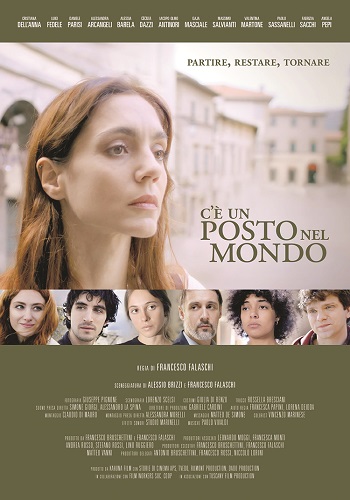Falaschi’s New Film Explores Italian Emigration
TORONTO – Italy’s emigration numbers have Italy’s emigration numbers have been trending upwards in recent years, as the majority of emigrating Italians are fleeing to Germany, the UK and America for better pay. While Italy does have net migration, a report by the Italian North East Foundation found that for every foreigner that settles in Italy, nearly nine young Italians leave. And in 2024, Italy recorded its highest exodus in a decade – 155,732. The concern over a brain drain is growing, and the Italian dilemma of whether to leave or stay is now making its way into films.
Director Francesco Falaschi’s There’s a Place in the World follows intersecting stories about three Italians on the precipice of a big move – away from Arcidosso Tuscany.
The first is a young researcher played by Luigi Fedele, who wavers between a future abroad and the connection to his home. Daniele Parisi plays a teacher who’s beloved by his students, while deliberating on a lucrative career move. Cristiana Dell’Anna rounds off the cast as a nostalgic psychologist returning home to sell a family property.
Falaschi believes the predicament is less about location than it is about identity. “Three episodes that respectively address the decisions to leave, stay, and return, but which share a common core: the idea that we feel at home not so much in a place, but in the meaningful relationships we build there and that we carry with us beyond”.
All very true. Still, a good portion of emigrating Italians might also decry a waning job market, abysmal salaries and a black hole of opportunities for professional advancement – as the predicament.
But There’s a Place in the World explores that tension in a way befitting the medium.
Falaschi approaches the subject with a firm acknowledgment of the fiscal realities each character faces, but focuses on what’s at stake at either end of the decision. The ability to secure a living while finding equilibrium or joy is the goal, but an often-moving target. And it’s there where the film finds its central theme.
“I have crafted three stories that speak of countries, but in reality, they speak of something more universal: disorientation. That inner state that affects anyone who urgently questions their true place in the world, the community to which they belong, the type of life they identify with”, says Falaschi.
And the type of life many native Italians identify with is uniquely distinct from much of the rest of the world. The modernity, efficiency and income levels they seek abroad comes at a price for Italians, which presents new challenges.
“There are moments in which everyone must choose where to stay”, is one of the film’s tag lines. Perhaps Falaschi will follow it up with a film set outside of Italy, tracking the lives of those who’ve made the move already.
Images courtesy of Kahuna Film
Massimo Volpe is a filmmaker and freelance writer from Toronto: he writes reviews of Italian films/content on Netflix






